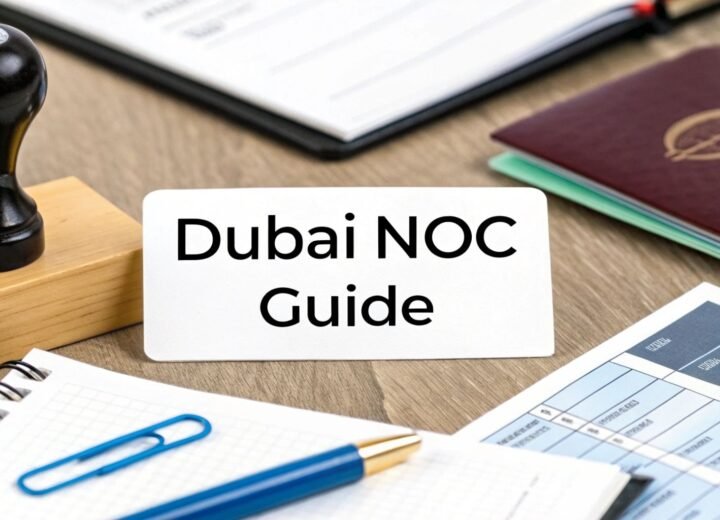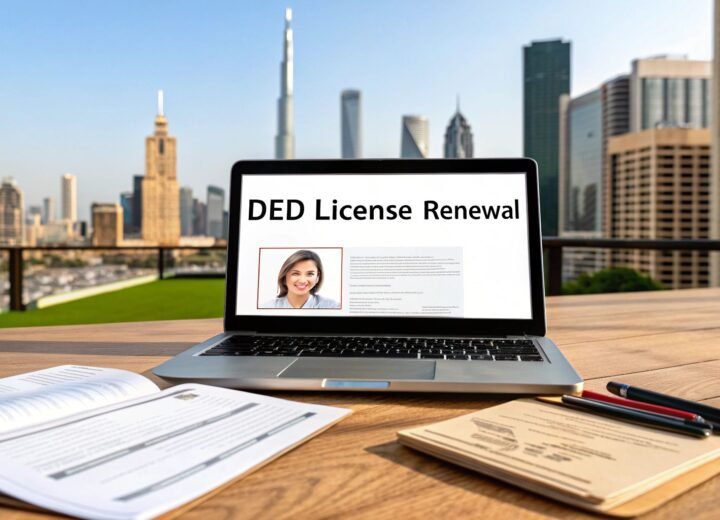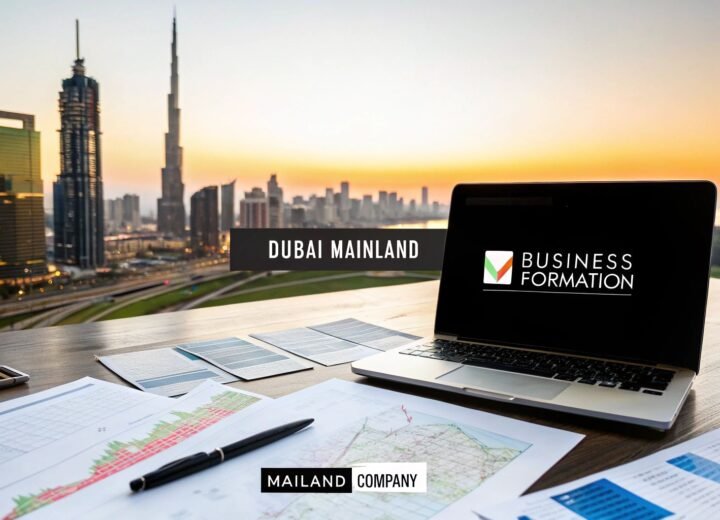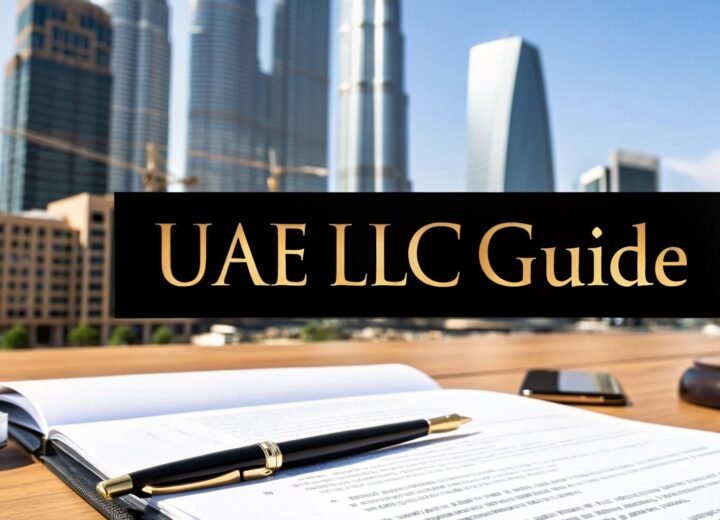Getting a trade licence in Dubai is the first, most critical step you'll take to legally set up shop in one of the world's most dynamic business hubs. Think of this official permit as your key to unlocking a market brimming with opportunity. It’s the government's stamp of approval, certifying that your company is authorised to carry out specific commercial activities here in the UAE.
Unlocking Your Business Potential in Dubai
Don't just see the trade licence as a piece of paper. It’s the very foundation of your business structure in the Emirates. The type of licence you go for—whether it's for a Mainland, Free Zone, or Offshore company—will shape everything that follows. It dictates your market access, your ownership rights, and even your eligibility for investor visas and tax advantages. Getting this decision right from the start is absolutely crucial for your long-term success.
This guide is your roadmap. We’ve designed it to demystify the entire process, from your initial idea right through to getting that final approval. We'll break down the key concepts you need to grasp and shed light on the real-world differences between each jurisdiction. All the insights here come from our years of hands-on experience helping businesses with company formation and corporate PRO services.
Why Dubai Is Your Ideal Business Destination
Entrepreneurs from around the globe are drawn to Dubai's pro-business environment, and for good reason. The government here actively encourages innovation and growth, and the economic numbers tell the story. Dubai's economy has shown impressive resilience and growth, with its GDP jumping 4% year-on-year to hit AED 119.7 billion in just the first quarter.
A big part of this surge is thanks to smart reforms in the trade licence system, all designed to attract foreign investment. This is a core part of the D33 agenda, which aims to double the city's economy by 2033. You can read more about how these reforms are making it easier to set up a business on Persian Horizon.
This powerful economic backdrop creates the perfect conditions for new ventures to thrive. Working with specialists can help you navigate this promising landscape. Our expertise includes:
- Mainland Company Formation in Dubai, Sharjah & Abu Dhabi: We are specialists in navigating the unique regulations of each Emirate.
- Freezone Company Formation across the UAE: Our team will help you select the ideal free zone that aligns with your business goals.
- Golden Visa on Property and Investor Visa: We are specialists in securing long-term residency for you and your family.
- Corporate PRO Services and Attestation Services: We are specialists in handling all your essential government liaison and document processing needs.
Our goal is simple: to provide cost-effective business setup solutions tailored to your needs and give you the knowledge to not just get your licence, but to truly enjoy UAE tax benefits for international entrepreneurs. With our 24/7 support service, we're always here when you need us.
📞 Call Us Now: +971-54-4710034
💬 WhatsApp Us Today for a Free Consultation
Choosing Your Path: Mainland vs Free Zone Licence

This is it—the most critical decision you'll make for your Dubai business. Choosing between a Mainland and a Free Zone licence shapes everything that comes next.
Think of it this way. A Mainland licence is like opening a shop on a bustling city high street. It gives you unrestricted access to trade anywhere in the UAE. You can deal directly with local customers, bid on government contracts, and even open branches across the Emirates.
A Free Zone licence, on the other hand, is like setting up in an exclusive, high-tech business park. It comes with some serious perks, like 100% foreign ownership and tax exemptions. The trade-off? Your direct business activities are generally confined to that specific zone and international markets.
Let's break down what really matters to help you pick the jurisdiction that fits your business model like a glove.
Understanding the Mainland Advantage
A Mainland trade licence, issued by the Department of Economy and Tourism (DET), offers the most operational freedom, period. If your plan is to sell directly to the UAE consumer market, provide local services, or work with government bodies, this is your most direct route. It allows you to set up a physical presence anywhere in Dubai, from a retail store in a packed mall to a high-rise office in the financial district.
This flexibility is a massive draw for entrepreneurs. You're not boxed into a specific geographical area, which gives your business maximum exposure and reach within the local economy. For anyone looking to build a serious local footprint, it's worth exploring our guide on Mainland Company Formation in Dubai to see the full scope of opportunities.
Your business structure influences everything from day-to-day operations to taxes and personal liability. It’s vital to pick a setup that gives you the right balance of legal protection and operational benefits for your specific goals in the UAE.
This isn't a small decision; it has long-term implications for your company's growth and how you're positioned in the market.
Exploring the Benefits of Free Zones
Dubai is home to over 40 specialised Free Zones, and each one is a world of its own. Whether you're in tech, media, commodities, or logistics, there’s a zone designed to create a powerful ecosystem for your industry. They offer streamlined setup processes, state-of-the-art infrastructure, and a ready-made community of like-minded companies.
The big advantages of a Free Zone trade licence really stand out:
- Complete Foreign Ownership: You keep full control of your business. No need for a UAE national partner.
- Tax Exemptions: You can benefit from 0% corporate and personal income tax, a major incentive for international entrepreneurs.
- Repatriation of Profits: You are free to transfer 100% of your capital and profits back to your home country without any restrictions.
- Simplified Procedures: Expect faster, less bureaucratic processes for setting up your business, getting visas, and handling other admin tasks.
These benefits make Free Zones incredibly attractive for businesses focused on international trade, consulting, or any service that doesn't need a physical storefront in the UAE mainland market.
A Side-by-Side Comparison for Clarity
To help you make an informed decision, it's useful to see the key differences at a glance. Your choice will ultimately boil down to your specific business activities, who you plan to sell to, and your long-term ambitions.
Here's a quick reference table to make things clearer.
Mainland vs Free Zone Licence At a Glance
| Feature | Mainland Licence | Free Zone Licence |
|---|---|---|
| Business Scope | Can trade directly anywhere in the UAE and internationally. | Primarily allowed to trade within the Free Zone and internationally. |
| Ownership Structure | 100% foreign ownership is now available for most activities. | 100% foreign ownership is standard for all licence types. |
| Office Requirement | A physical office lease (Ejari) is generally mandatory. | Flexible options, including virtual offices and flexi-desks, are common. |
| Visa Eligibility | Typically linked to the size of the physical office space. | Often based on a predetermined visa package, which can be more flexible. |
| Government Tenders | Eligible to bid for lucrative UAE government contracts. | Generally not eligible to bid for government projects directly. |
Seeing these options laid out side-by-side should give you a better feel for which path is right for your venture.
The UAE's pro-business policies are clearly working. The country recently shot past 1.5 million active commercial licences, a historic high that shows just how confident local and international investors are. Dubai has been at the heart of this surge, with huge growth in both Mainland and Free Zone registrations thanks to these streamlined regulations.
Whether you choose the wide-open market access of the Mainland or the specialised perks of a Free Zone, our experts can provide advice tailored to your goals. We'll make sure your choice lines up perfectly with your ambitions and sets you on the path to success.
Your Step-by-Step Guide to Getting Licensed
Applying for a trade licence in Dubai can sometimes feel like you’re trying to build flat-pack furniture without the instructions. But once you break it down into a clear sequence, the whole thing becomes much more straightforward. Think of this section as your practical checklist, walking you through each stage without any confusing jargon.
Whether you're aiming for the local market with a Mainland company or chasing global opportunities from a Free Zone, the fundamental steps are pretty similar. It’s a logical journey, starting with defining your business and ending with that official permit in your hands.
Step 1: Define Your Business Activities
Before you do anything else, you need to decide exactly what your business will do. This isn't just for your business plan; it's a critical legal requirement. In Dubai, every trade licence is tied to a specific list of approved business activities.
It’s a bit like choosing your major at university—that choice dictates the courses you take and the degree you get. Similarly, the activities you select determine your licence type (Commercial, Professional, or Industrial), which government approvals are needed, and even which locations you can operate in. Both Dubai’s Department of Economy and Tourism (DET) and the various Free Zone authorities have massive lists with over 2,000 potential activities to choose from.
Getting this right from the start is crucial. If you operate outside your licensed activities, you could face hefty fines. Our team can help you pinpoint the exact activity codes that fit your business model, making sure you’re fully compliant from day one.
Step 2: Reserve Your Unique Trade Name
Your company’s name is its identity. But in Dubai, it also has to follow specific rules set by the authorities. The name can't violate public morals, it can't already be taken, and it shouldn’t have any religious or political undertones unless you have special permission.
The process involves submitting a few name options for approval. To avoid getting stuck, it’s smart to check for availability beforehand and have a list of alternatives ready. This is a detail-oriented step, and having a name rejected can bring your entire application to a halt.
Once a name is approved, it’s officially reserved for you. This secures your brand’s legal identity in the UAE market and clears the way for the next stage.
Step 3: Secure Initial Approval
Think of the Initial Approval as a major milestone. It's the government's way of saying they have no objection to you starting your business in Dubai. You absolutely need this certificate to move on to other steps, like drafting legal documents or signing an office lease.
To get this approval, you’ll submit your first application along with identification documents for all partners and shareholders. If your business is in a specialised field like healthcare or engineering, you might need extra approvals from relevant government ministries at this point.
This step is basically a green light from the authorities. It signals that your business idea and its owners have met the first set of requirements for a trade licence in Dubai. It's your permission to proceed with the formal setup.
This is where our corporate PRO services really shine. We make sure all the paperwork is perfectly aligned with what the government needs, manage the submissions, and handle the follow-ups. This helps you avoid common mistakes that cause frustrating and expensive delays.
Step 4: Prepare and Attest Legal Documents
With your Initial Approval secured, it’s time to formalise your company’s legal structure. This means preparing and signing key documents, the most important being the Memorandum of Association (MOA) for Mainland companies or similar incorporation papers for Free Zones.
The MOA is your company's constitution. It lays out all the critical details, including:
- Shareholding Structure: Who owns what percentage of the company.
- Business Objectives: A detailed list of the activities the company is allowed to do.
- Management Framework: Who the managers are and what powers they have.
- Capital Contribution: The total amount of capital invested in the business.
These documents have to be drafted in both English and Arabic and then notarised by a public notary. Sometimes, they need to be attested by other government bodies, too. Precision is everything here—even a tiny error can get your documents rejected.
Step 5: Finalise Your Business Address
Every business in Dubai must have an official address. For a Mainland company, this usually means leasing a physical office and registering the tenancy contract with Ejari, Dubai's official online registration system. The size of your office can even affect how many employee visas you’re eligible for.
Free Zones, on the other hand, offer more flexibility. Many provide cost-effective options like flexi-desks or virtual offices. These solutions satisfy the legal requirement for an address without the high overheads of a full-time physical space, which is a huge plus for startups and international entrepreneurs.
Step 6: Submit Final Application and Make Payment
This is the final hurdle. You’ve got all your approvals, your documents are attested, and your office lease is signed. Now, you can submit your complete application file to the relevant authority—either the DET for Mainland or the specific Free Zone administration.
Once they review and approve your submission, you'll be issued a payment voucher for the trade licence fee. After you process the payment, you will officially receive your trade licence in Dubai. Congratulations, your company is now legally registered and ready for business
Understanding the Documents and Costs
Getting your business set up in Dubai shouldn't be stressful, and the key to that is transparency—knowing exactly what paperwork you need and what the budget looks like from day one. Before you can even think about launching, you need to gather your documents and get a firm grip on the financials. This way, there are no nasty surprises down the road.
Think of getting your paperwork in order like laying the foundation for a house. Every single piece has to be in its right place and absolutely correct. For a trade licence in Dubai, the list of required documents is pretty standard, but there's zero room for error.
This visual flow breaks down the core stages, from gathering your documents right through to getting your licence in hand. It’s a logical journey that moves from preparation and approvals to the final issuance that makes your business official.
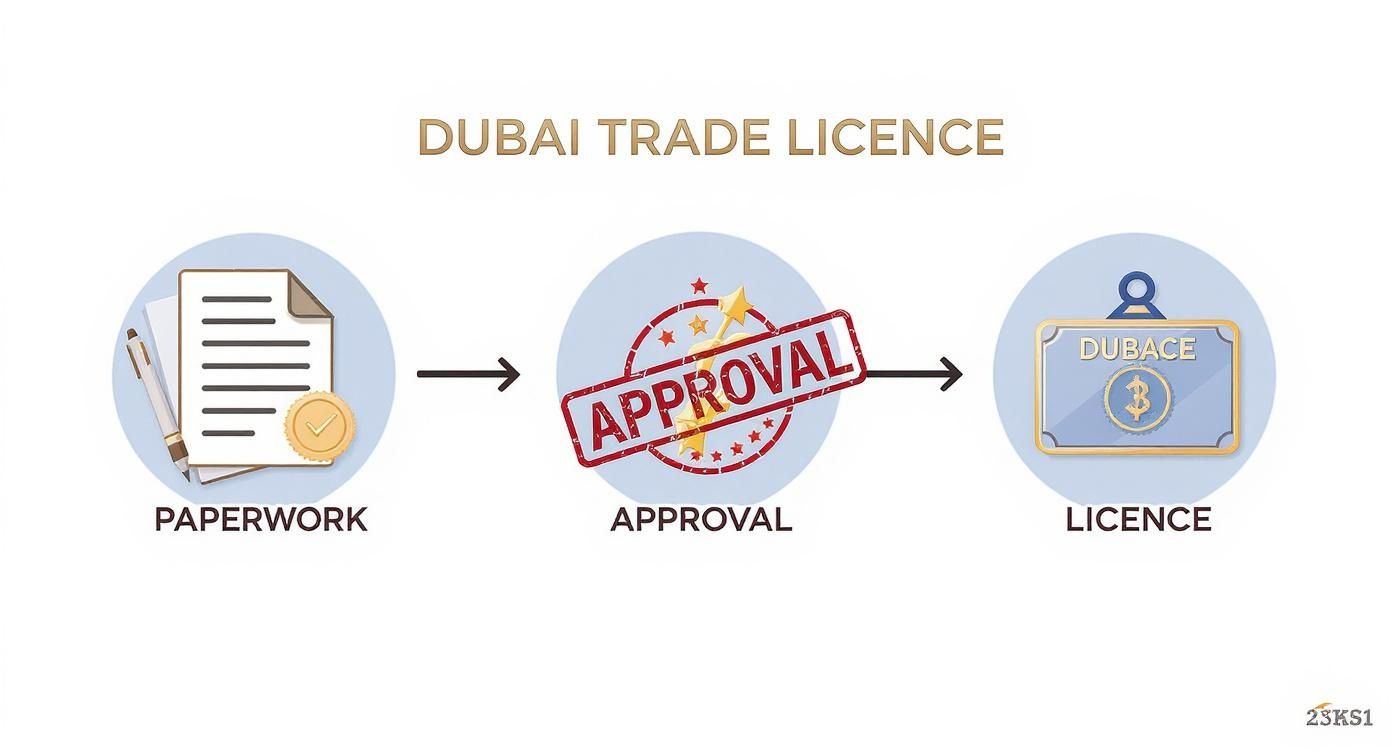
As you can see, obtaining your licence is a clear, step-by-step process where each stage builds on the last.
Your Definitive Document Checklist
While the paperwork can differ slightly between Mainland and Free Zone authorities, there's a core set of documents you'll almost always need. Our corporate PRO specialists make sure these are prepared and attested correctly to sidestep any potential delays.
Here's your essential checklist:
- Passport Copies: Clear, valid copies for all shareholders and the appointed manager.
- Visa and Entry Stamp: Copies of the current visa page and UAE entry stamp for all partners.
- Application Form: The completed licence application form from the relevant authority (that’s DET for Mainland or the specific Free Zone).
- Legal Documents: Your notarised Memorandum of Association (MOA) and any other required constitutional documents.
- Tenancy Contract (Ejari): A registered lease agreement for your physical office space is a must for most Mainland licences.
Having these documents ready to go dramatically speeds up the entire process. Our team can handle the attestation and legal translation for you, ensuring every piece of paper meets the strict government standards.
Demystifying the Cost of a Dubai Trade Licence
One of the very first questions on every entrepreneur's mind is: "So, how much is this going to cost me?" The honest answer is that there’s no single price tag. The final amount is a sum of several different fees. It's a bit like building a custom car—the final price depends on the engine, features, and finishes you choose.
Your total investment will be shaped by your business activity, your chosen jurisdiction (Mainland vs. Free Zone), and your office needs. It’s this flexibility that makes Dubai such a dominant commercial hub. In fact, Dubai alone is home to nearly 990,000 business licences, which is a staggering 59% of all business licences issued across the entire UAE.
The main cost components generally break down like this:
- Initial Approval Fee: A small charge to get the green light from the authorities.
- Trade Name Reservation Fee: A fee paid to secure your chosen company name.
- Attestation and Notary Fees: These are the costs for preparing and legally verifying documents like your MOA.
- Office Rent: This can be anything from a cost-effective virtual office in a Free Zone to a premium physical space on the Mainland.
- Licence Issuance Fee: The final government fee you pay to receive your official trade licence.
Beyond the initial setup, businesses involved in global commerce also need to think about potential charges like ecommerce tariffs. Factoring these into your financial plan from the start is just smart business.
We are committed to providing cost-effective business setup solutions that are genuinely tailored to your needs. We break down every potential expense so you can build a realistic budget with no hidden fees, allowing you to invest your capital where it matters most.
For a much deeper dive, have a look at our guide on the trade license cost in Dubai. Our experts are also on hand to provide a customised quote based on your specific business goals, ensuring you have complete financial clarity from the get-go.
Managing Your Licence After Issuance
Getting your trade licence in Dubai is a massive milestone, but it’s really just the beginning of your journey. Think of your licence not as a one-time document, but as a living part of your business that needs regular attention to keep everything running smoothly and legally.
Your focus now pivots from the initial setup to ongoing maintenance. This involves a couple of straightforward but critical tasks: renewing your licence every year and updating it whenever your business changes. Staying on top of these things is key to avoiding fines or, worse, disruptions to your operations.
The Annual Renewal Process
Every single trade licence in Dubai has to be renewed annually. This isn't optional; it's a mandatory requirement to keep operating legally in the UAE. The good news is the process is usually quite simple as long as you act on time.
Here's a quick look at what’s involved:
- Renewing Your Tenancy Contract: First things first, you need a valid Ejari (tenancy registration) for the coming year.
- Submitting the Renewal Application: You’ll submit this to the same authority that issued your licence in the first place, whether that’s the DET for a Mainland company or the specific Free Zone authority.
- Paying the Fees: Once your application gets the green light, you’ll pay the renewal fees, and in return, you'll receive your updated licence.
This annual check-in ensures all your company details are up-to-date and compliant. For a more detailed look, we've put together a complete guide on Dubai trade license renewal.
Handling Common Licence Amendments
Businesses never stand still. You might decide to offer new services, bring on a partner, or move into a bigger office. Whenever these kinds of changes happen, your trade licence needs to be officially updated to reflect them. This update is called an amendment.
Ignoring this step can create serious compliance headaches down the road. Our corporate PRO services are designed to manage these changes for you, ensuring that as your business grows, your licence keeps pace without any hitches. And if you have any questions along the way, we offer 24/7 support to help.
Properly managing licence amendments is just as crucial as the initial setup. It shows the authorities that your business is transparent and committed to following the rules, which goes a long way in building your reputation in the UAE market.
Some of the most common amendments we handle for clients include:
- Changing Business Activities: Adding or removing services from your official list.
- Adding or Removing a Partner: Adjusting your company’s ownership structure.
- Updating a Trade Name: Rebranding or legally changing your business name.
- Changing Your Business Location: Officially registering a move to a new office.
Each type of amendment has its own set of procedures and required documents. Trying to navigate this alone can lead to simple mistakes that cause delays. By working with specialists who do this every day, you can be sure it’s done right the first time. Our goal is to provide cost-effective business setup solutions that support you from day one and throughout your company's entire lifecycle.
Common Questions About Your Dubai Trade Licence
Jumping into Dubai's business world is exciting, but it naturally comes with a lot of questions. We get it. To help you out, we've put together some straight answers to the most common queries we hear from entrepreneurs just like you. Think of this as a practical guide, drawing from our years of hands-on experience setting up companies and handling visas in the UAE.
Our aim is to cut through the jargon and give you clear, useful information so you can make the best decisions for your new venture.
Can I Get a Dubai Trade Licence Without a Physical Office?
Yes, absolutely—and it’s a very popular route for startups. You can definitely secure a trade licence in Dubai without leasing a full-blown physical office. Free zones, in particular, are famous for this, offering flexible setups like virtual offices or flexi-desk packages. These solutions are brilliant because they satisfy the legal need for a registered address but at a tiny fraction of the cost of a traditional office.
Even on the Mainland, the rules are becoming more flexible. Certain professional activities can now qualify for similar lean setups. However, whether a virtual office is right for you boils down to your specific business activity and where you choose to set up shop.
The right office solution is a strategic decision, not just an address. It directly impacts your initial setup costs and operational overheads. Choosing a cost-effective option like a virtual office allows you to allocate more capital towards growth-focused activities.
As specialists in both Mainland and Free Zone company formation, we can look at your business model and point you to the most practical, legally sound office solution. This way, you tick all the regulatory boxes while keeping your startup costs low.
How Long Does It Take to Get a Trade Licence in Dubai?
The timeline really varies. If you're in a Free Zone, things move quickly. They're designed for speed, and you could have your licence in just a few working days. They use a streamlined, one-stop-shop approach that cuts out a lot of the usual red tape.
A Mainland licence generally takes a bit longer, usually somewhere between one and four weeks. That’s because it involves getting the green light from several government bodies, like the Department of Economy and Tourism (DET), and sometimes other ministries depending on what your business does.
Most delays are completely avoidable. They almost always boil down to a few common hiccups:
- Incorrect Paperwork: Submitting documents that are incomplete, not attested correctly, or in the wrong format.
- Trade Name Issues: Choosing a business name that doesn't follow the rules or is already taken.
- Delayed External Approvals: When your business activity needs a special nod from another ministry.
Working with experienced Corporate PRO Services can make a huge difference here. Our team knows the process inside out and makes sure every document is perfect the first time, helping you sidestep common pitfalls and get your business up and running much faster.
What Happens if I Operate Without a Valid Trade Licence?
Operating a business in Dubai without a valid trade licence is a serious no-go. The authorities are very strict about enforcing business laws to keep the market fair and transparent for everyone. If you’re caught running a business without the right legal permit, the consequences can be severe.
You could be hit with hefty fines, your business could be shut down on the spot, and your name could be blacklisted. Getting blacklisted is a major problem, as it can stop you from ever opening another business in the UAE.
For expats, the situation can be even more serious, potentially leading to legal trouble and even affecting your residency status. Getting properly licensed isn't just a bureaucratic step—it’s fundamental to protecting your investment, your reputation, and your future in Dubai.
Does My Trade Licence Make Me Eligible for an Investor Visa?
Yes, it does! Getting your trade licence is the crucial first step to securing an investor or partner visa, which is what gives you residency status in the UAE. For many international entrepreneurs, this is one of the biggest draws of setting up a company in Dubai.
Once your company is officially licensed and registered, you're eligible to apply for a residency visa as the business owner. The number of visas your company can sponsor usually depends on things like the size of your office and what your business does.
We specialise in handling both Investor Visas and the prestigious Golden Visa programme. We’ll manage the entire application for you and your family, from getting the initial entry permit to the final visa stamping. Our 24/7 support service is there to ensure the whole process is as smooth and stress-free as possible, so you can focus on what you came here to do: build a successful business.
At PRO Deskk, we are specialists in guiding entrepreneurs through every step of this journey, from choosing the right jurisdiction to managing long-term compliance. Our cost-effective business setup solutions are designed to make your entry into the UAE market as smooth as possible.
📞 Call Us Now: +971-54-4710034
💬 WhatsApp Us Today for a Free Consultation at https://prodesk.ae

